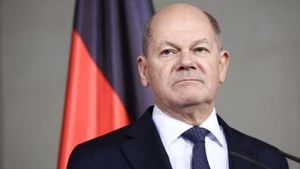Cuba's sociopolitical climate is experiencing notable shifts as the nation navigates both international relations and pressing internal challenges. The recent remarks by Japanese ambassador to Cuba, Nakamura Kazuhito, during the celebration of Emperor Naruhito's 65th anniversary showcase the improving diplomatic relations between Cuba and Japan, highlighting the strong ties between the two countries.
Nakamura praised the extraordinary relationship, stating, "Cuba and Japan have an extraordinary relationship, which transcends cultural borders and constitutes a pillar for our nations." He noted key milestones, including the significant visits made by senior leaders from both countries, including the former First Vice President of Cuba, Miguel Díaz-Canel, and the former Japanese Prime Minister Shinzo Abe, which have strengthened bilateral ties and facilitated meaningful cooperation.
Despite these strides, Cuba is currently grappling with serious shortages of intimate hygiene products, especially affecting women. Reports highlight particularly dire conditions in the province of Guantánamo, where sanitary pads were only distributed twice throughout 2024. The scarcity stems from numerous issues, including raw material shortages and funding limitations within the national industry. Yanelis Galdeano Vega, Chief Commercial Specialist at the Commercializing Company of Medicines (EMCOMED), commented, "The shortage of intimate products... has hit Cuban women hard..." This situation forces many to turn to the informal market, where prices can soar, creating additional economic strain.
The hurdles encountered by Cuban women serve as just one facet of the broader humanitarian crisis within the country, compounded by the Cuban government's management of medical supply shortages and their dependency on foreign aid. Carlos Lazo, leader of the Bridges of Love movement, has emerged as a vocal advocate for humanitarian assistance, recently addressing allegations of governmental obstruction over aid deliveries. "The truth is, the neighborhood must brace itself for tough times," Lazo remarked, emphasizing the need for unity among Cuban citizens as they face impending challenges.
Following his comments, the Cuban Ministry of Public Health issued clarifications, stating, "Since last Thursday, February 20, social media has been circulating statements by Carlos Lazo..." They emphasized there has never been a refusal to accept donations directly at its institutions, insisting on prior communication for organized delivery to avoid disrupting medical processes.
This back-and-forth reflects the tension surrounding the Cuban regime's approach to humanitarian aid, with critics like Lazo spotlighting the difficulties faced by those trying to contribute positively to healthcare initiatives. Strikingly, the issue of aid has polarized communities, with Lazo previously facing backlash from the Cuban exile community for his calls to lift the U.S. embargo and his interactions with the government. A campaign labeled him "persona non grata" by over 10,000 signatures from the Cuban community in Florida, showcasing the deep divisions within the Cuban diaspora.
Meanwhile, internal criticisms extend to the Castro family, particularly focusing on Antonio Castro, the youngest son of Fidel Castro. An opinion piece published by La Habana Tribune titled "The Travels of Gulliver Junior's Travels" satirizes Antonio's lifestyle of privilege, contrasting it sharply with the realities faced by most Cubans. The article amusingly depicts Antonio's luxurious travels, stating, "Thanks to his father, Gulliver Jr. travels quite often..." This critique of excess amid widespread scarcity highlights the growing frustration among ordinary citizens and their expectations of governmental accountability.
The juxtaposition of improving international relations and the struggle for basic necessities reflects the current dynamics embroiling Cuban society. The efforts noted between Cuba and Japan to strengthen cooperation, particularly through projects tied to renewable energy and health care, are promising. Yet, as the Japanese ambassador noted, there are needs for sustained improvement and greater trade connections to match the historical patterns of the 1960s and 70s.
While these diplomatic efforts are important, they stand starkly against the backdrop of disparities within the country, as illustrated by the struggles women face just to maintain basic hygiene. Citizen outrage over luxury as described through the lens of the Castro family’s lifestyle continues to intensify as everyday Cubans strive to survive against mounting economic challenges and limited resources.
Many observers remain cautious yet hopeful, reflecting on the ambassador's metaphorical optimism: “Just as there are stormy days, sunny days will also return.” Whether these sentiments will translate to meaningful change remains to be seen—what’s clear is the interplay of diplomatic gestures and stark domestic realities is shaping the future of Cuba, calling for both resilience and unity among its inhabitants as they confront their challenges together.



